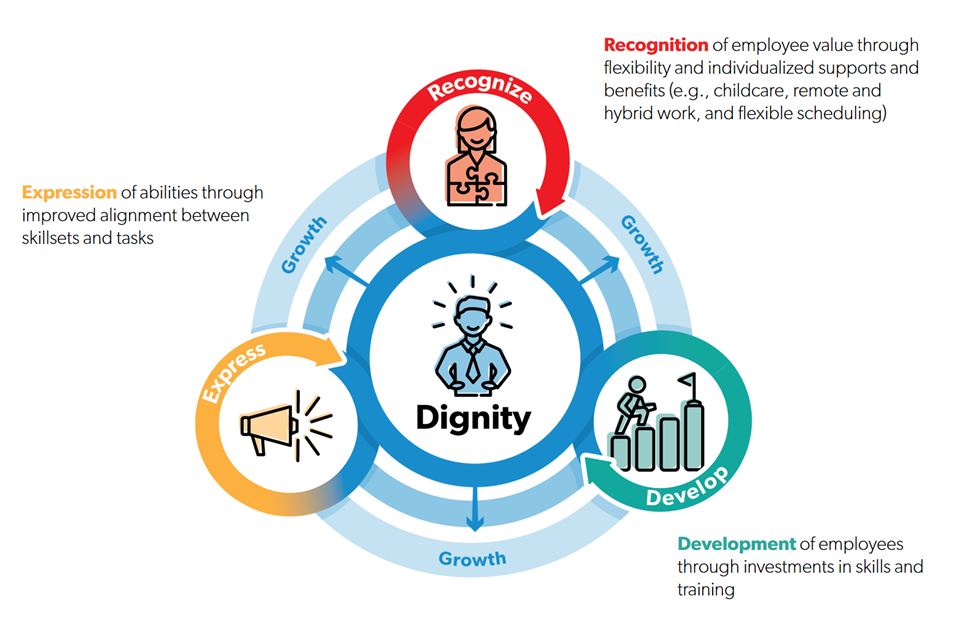For more than a year, companies and their workers have been stuck in a resignation doom-loop. According to the Bureau of Labor Statistics, there were more than 47 million voluntary quits—close to one-third of the workforce—in 2021. These quits were concentrated among lower-wage service and hospitality workers seeking “greener” pastures. To break this cycle, employers need to begin rethinking both the meaning of work and the dignity of workers.
Employers’ primary retention strategy—raising wages—isn’t working with inflation eroding wages increases as fast (or faster) than workers can change jobs. Where wage increases don’t work, the office “pizza party” has become a cultural cliché representing the shallow end of the retention effort pool. Larger corporations have taken to hiring chief happiness officers whose job entails creating “whimsical” corporate cultures that will make work feel more like fun.
Both of the above approaches to worker retention are on-the-cheap alternatives to genuine engagement, seeking to distract workers rather than address deeper sources of dissatisfaction. The result is a social-economic environment in which employers and workers treat each other instrumentally, as means to other ends rather than ends in themselves that require mutual commitment. An exclusive focus on material compensation overlooks the role work plays in how human beings express their agency and dignity.
In a new report, I explore how companies might begin to rethink employee engagement and development to slow a workforce churn that is both expensive and disruptive. While making a living may be the most important feature of a job, it is not the only one. Work is economic but it is also social, part of a broader, more fundamental human drive to connect, pursue shared objectives, and develop individual potential.
Worker surveys reveal how employers are missing the social nature of work. Dissatisfaction about pay doesn’t crack the top five reasons for why workers leave their jobs. Instead, workers cite uncaring leaders, unsustainable expectations, a lack of professional development opportunities, an absence of meaning and purpose, and a lack of interest in personal well-being. Toxic corporate culture contributes 10.4 times more to quits than compensation.
To counteract this dynamic, my paper proposes a reimagined “dignity at work” talent development strategy that places human dignity at the center of a threefold process of recognizing, developing, and expressing talent on the job.
Human Dignity-Centered Employee Talent Acquisition and Development

First, employees walking through the door should be recognized as multidimensional with attributes, beliefs, skills, and behaviors that have dignity and value beyond what they are able to produce. A number of leading companies have incorporated dignity as a central operating principle and benefited from it. For instance, Cisco built a psychologically safe environment explicitly valuing dignity first through a promise called “Our People Deal,” and boosted its retention far beyond other companies in turnover-heavy Silicon Valley. In practical terms, one of the best ways to acknowledge worker dignity is by providing greater flexibility for managing family and life needs.
Recognition of dignity, and the certainty and safety it fosters, creates a foundation of trust upon which the development of the individual interests, knowledge, skills, and abilities (IKSAs) of each worker can take place. This is important for avoiding stagnation and providing a sense of personal progress. Development can come from in-house training programs, mentoring, or financial support for worker education. Walmart, Amazon, and Gap are making significant investments in worker education because it is in the shared interest of the companies and their employees as they adapt to ongoing technological and economic change.
The final stage is aligning IKSAs to actual day-to-day work. This alignment allows workers to express their talents through their work, taking responsibility for a specific part of the company’s business process, and thus yielding a greater sense of connection between work and the company’s joint mission. For instance, if an employee is given the opportunity to develop a new language skill through a company’s talent development program, the expression step would entail being given projects that leverage a bilingual skillset (e.g., a chain store trains personnel in Spanish and then ensures the employee’s job involves Spanish-language activities.) The same would be true for other up-skilling efforts: companies should strive to keep a strong alignment between education, training, and work. When this kind of alignment is achieved between tasks and skills, the result is a sense of “flow,” a kind of pleasurable absorption in tasks that use IKSAs at their highest and best without becoming excessively demanding.
For businesses watching their bottom lines and accountable to market valuations, this reimagining can seem costly and impractical. However, accepting high retention is also costly with significant impact to corporate bottom-lines. The average replacement cost for entry level workers is 30 to 50 percent of their salary; for mid-level employees, 150 percent; and, for highly specialized employees, 400 percent. Gallup estimates that in the U.S. turnover costs amount to $680 billion, dwarfing the $165 billion spent on training and engagement activities. In the trade-off between the cost of meaningful engagement and turnover costs, a better balance is waiting to be struck.
Businesses are human endeavors that serve human beings—owners, customers, stockholders and workers. What today’s quits-crisis is telling us is that human ingenuity and labor, upon which all business success rests, needs attention and shoring-up. Reimagining talent investment strategies with human dignity at the center can help build greater workforce stability and productivity to the benefit of workers and employers.








Please note that we at The Dispatch hold ourselves, our work, and our commenters to a higher standard than other places on the internet. We welcome comments that foster genuine debate or discussion—including comments critical of us or our work—but responses that include ad hominem attacks on fellow Dispatch members or are intended to stoke fear and anger may be moderated.
You are currently using a limited time guest pass and do not have access to commenting. Consider subscribing to join the conversation.
With your membership, you only have the ability to comment on The Morning Dispatch articles. Consider upgrading to join the conversation everywhere.